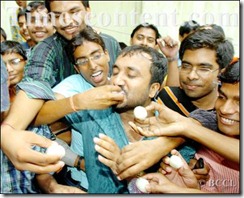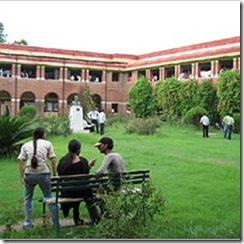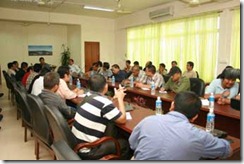By Sai Kumar
The most pressing question on the minds of students appearing for the examination is ‘How do I tackle the Online CAT?’
The most obvious aspect of the 'Online CAT' that concerns students is the emphasis on the word 'Online' rather than the the word CAT.
Well, the answer is to keep things simple and not to worry about the 'Online' format, instead concentrate on the 'content' of the paper.
CAT is more a test of elimination than a test of selection. The successful candidates often attribute their success to their approach -- a poised and calm mind, avoid errors and do not fall into the traps that the exam often surprises you with. This article will address the common errors that students make in the run-up to CAT.
Some of the common errors are as follows:

Error#1: Preparing only for select topics
One of the serious flaws in the approach over the years has been to narrow down the syllabus and prepare only for select topics based on questions that have appeared in the past few years of CAT. CAT has been an extremely unpredictable examination and is known to spring a surprise every year. There is a high probability that topics or areas that have not had much of a weightage in recent years might make a comeback. Therefore it is in the best interest of students to prepare for all topics.
Error#2: Speculating on the composition of the paper
CAT is known to ask questions from a wide assortment of test areas and therefore there is no point speculating as to what might happen this year. The IIMs have hinted that there will be 'around' 60 Qs across three sections: Verbal, Quantitative and Logic & Data Interpretation in CAT2010.
Error#3: Overdose of mocks
Most students believe that the best way to prepare is to take as many mocks as possible. Repeated mock tests only highlight the same weaknesses and if students are not analysing their mistakes and rectifying them, then there will not be any major improvement in their performance. Therefore, a thorough analysis of every mock test will yield far better results than taking a large number of such tests.

Error#4: Missing out on items to be carried to the examination centre
This year, students should carry their Admit Card, the CAT Voucher, a Valid Photo identity (any among Driver's License, Passport, PAN Card, Voter ID, College ID, Employee Identification Card or a notarised affidavit with photo, signature, date of birth and residential address) and a valid document as proof in case the student belongs to the SC/ST categories.
Error#5: Blind guessing
It is has been observed in 'experimental' conditions that blind guessing almost always leads to a negative/low score, therefore avoid blind-guessing and marking answers indiscriminately. However, if you are able to eliminate two/three choices (out of the four or five) on proper reasoning, then, it is not advisable to leave out the question even if you do not know how to solve it.

Error#6: Unequal distribution of time across sections
The IIMs calls only those students who manage to clear the cut-offs in each section of CAT and also the overall cut-off. To meet this objective it is imperative that you spend equal amounts of time across all three sections to give yourself enough opportunity to clear the cut-off in every section.
Error#7: Not having a buffer time
This year the exam will be for 135 minutes and a good time allocation strategy would be 40 minutes across three sections with 15 minutes of buffer time. The buffer is required to cushion against bad performance in any one section or to tackle a section that is exceptionally difficult, or one where the student is not confident of clearing the cut-offs.

Error#8: Targeting a specific number of Qs to clear cut-offs
Targeting a pre-set number of questions to clear the cut-offs is not a great strategy, as the cut-offs are a function of the difficulty level of the section and the paper. Hence, one can decide to attempt a certain number of questions during the exam but not before.
(The author, Sai Kumar, is director of TIME Mumbai, a coaching centre for MBA aspirants)
Source: Business Standard
 Shillong, Oct 26 : Students of the Institute of Chartered Financial Analysts of India University (ICFAI), Meghalaya on Monday decided to boycott classes and examinations after coming to know that the institution is an autonomous body and “not a Central university as announced earlier”.
Shillong, Oct 26 : Students of the Institute of Chartered Financial Analysts of India University (ICFAI), Meghalaya on Monday decided to boycott classes and examinations after coming to know that the institution is an autonomous body and “not a Central university as announced earlier”.



 Only 11 candidates passed the June 2010 National Eligibility Test for English, whose results were announced on October 9. Of these, there are only two recipients of the Junior Research Fellowship (JRF).
Only 11 candidates passed the June 2010 National Eligibility Test for English, whose results were announced on October 9. Of these, there are only two recipients of the Junior Research Fellowship (JRF).








 Kids love to cook. "Chicken sabzi" with muck and flowers and "maggi noodles" with curly creepers along with soil for spices, they love rattling those toy vessels outdoors.
Kids love to cook. "Chicken sabzi" with muck and flowers and "maggi noodles" with curly creepers along with soil for spices, they love rattling those toy vessels outdoors. 






 The most definitive survey of Indian business schools is out.
The most definitive survey of Indian business schools is out.




 Melbourne, Sep 2 : Attacks on Indian students in Australia may have hit their enrolment into varsities here, with new figures showing a slump by almost half.
Melbourne, Sep 2 : Attacks on Indian students in Australia may have hit their enrolment into varsities here, with new figures showing a slump by almost half. 


























